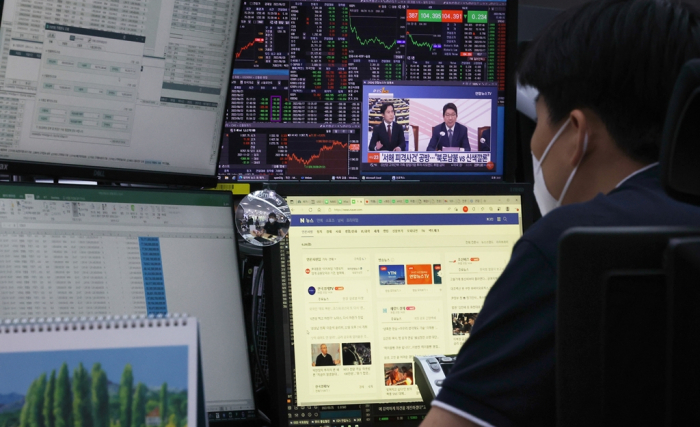
A trader at KEB Hana Bank's dealing room in Seoul watches financial market data and news South Korea’s shares on Friday rebounded after tumbling in the previous two straight sessions, outperforming their peers in Asia, but few expected the local market to be out of the woods anytime soon.The main bourse Kospi ended up 2.26% at 2,366.60 on strong demand from domestic financial institutions, which bought a net 676.5 billion won ($522 million). Recently battered growth stocks led the rebound. Samsung Electronics Co. rose 1.74%, while Naver Corp. and Kakao Corp. surged 5.77% and 6.56%, respectively.The tech-heavy Kosdaq also soared 5.03% -- the first time since March 2020 that the junior index has risen more than 5%.That compared with a 1.23% gain in Japan’s Nikkei 225 and a 0.89% rise in China’s benchmark Shanghai Composite Index.Regional stock markets advanced on fears of a global recession, which dragged down commodity prices and interest rates. The yield on the benchmark US 10-year Treasury bond fell 7.5 basis points to 3.088%, after dropping to as low as 3.01%. Lower bond yields prompted investors to buy tech shares, which have suffered sharp losses, on dips.“Concerns over the US Fed’s monetary policy were alleviated amid emerging predictions that inflation expectations may ease,” said Lee Kyung-min, an analyst at Daishin Securities Co.The Federal Reserve has been pledging to raise interest rates to bring prices under control even as the US central bank acknowledged the possibility of a recession.The rebound in South Korea’s stocks sparked some hopes that they will bottom out in the near term. But most analysts said the market has yet to reach that stage, saying the Friday’s gains were merely technical after excessive losses.Domestic shares are likely to resume their declines once the market returns its gaze to bearish factors such as signs of accelerating inflation, they added.“To see a rebound trend, foreigners must return to the market with continuous purchases,” said Lee Jae-seon, an analyst at Hyundai Motor Securities. “The market lacks any driving force to reverse the trend, given a tumbling won and high inflation.”Foreign investors unloaded a net 49 billion won in the Kospi on Friday, extending their selling spree to a sixth straight session. They dumped a combined net 2 trillion won during those sessions.By Sung-Mi Shimsmshim@hankyung.comJongwoo Cheon edited this article.
Most Read